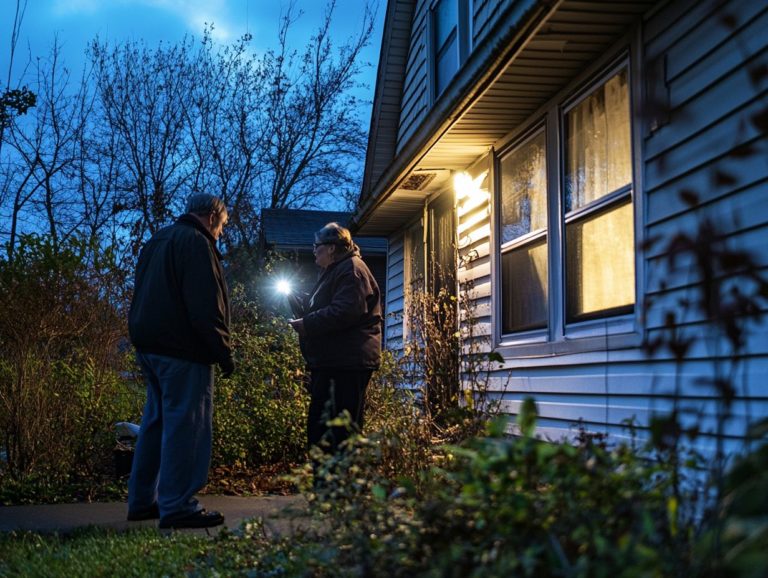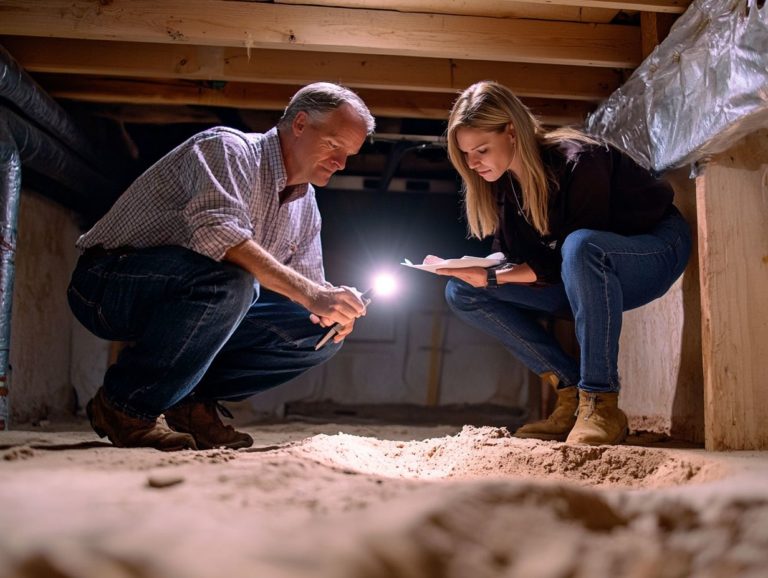How to Choose the Best Home Inspector Near You
Buying a home stands as one of the most significant investments you will ever make. Ensuring that this investment is sound is absolutely crucial.
A professional home inspection can reveal potential issues that might not be immediately visible. This can save you from unexpected repairs in the future.
This article delves into the reasons why hiring a qualified home inspector is essential. It also covers how to pinpoint the right one for your needs and the key factors to consider during the inspection process.
With the right guidance, you can navigate your home-buying journey with unwavering confidence.
Contents
- Key Takeaways:
- The Importance of Home Inspections
- Qualities to Look for in a Home Inspector
- Researching and Finding Home Inspectors Near You
- Questions to Ask During the Inspection Process
- Understanding the Inspection Report
- Frequently Asked Questions
- 1. What should I consider when choosing a home inspector near me?
- 2. How can I verify the credentials of a home inspector near me?
- 3. What type of experience should a good home inspector have?
- 4. How important is a home inspector’s reputation?
- 5. What should be included in a home inspection report?
- 6. How can I find the best home inspector near me?
Key Takeaways:

1. Hiring a professional home inspector is crucial for a thorough inspection and peace of mind during the home-buying process, so it’s important to know how to spot a good home inspector.
2. When researching inspectors, prioritize experience, knowledge of local building codes, and communication skills for a successful and informative inspection.
3. Utilize online reviews, recommendations, and referrals from real estate agents to learn how to choose the best home inspector near you.
The Importance of Home Inspections
Home inspections are essential for ensuring you, as a potential buyer, are fully informed about the condition of a property. This is necessary before making that significant purchase.
A comprehensive inspection can reveal hidden issues. These may involve structural integrity or heating and cooling systems, which can greatly influence both your home-buying experience and the property’s value.
By engaging a certified home inspector, you can uncover the true state of the home. This enables you to negotiate a fair sale price and sidestep costly repairs down the line.
Why You Need a Professional Home Inspector
Hiring a professional home inspector is crucial for you as a homebuyer aiming to make a well-informed purchase. These experts are equipped with the skills necessary to conduct a thorough inspection of the property.
With their specialized training and certifications, these inspectors can uncover hidden issues that might escape your notice, such as mold infestations or plumbing problems that could lead to costly repairs later on.
Evaluating customer reviews enhances your decision-making process. This provides valuable insights into the experiences and satisfaction levels of past clients.
Opting for an inspector who is part of professional organizations demonstrates a commitment to industry standards and ongoing education. This gives you further assurance that you’re receiving a quality service prioritizing thoroughness and professionalism.
Qualities to Look for in a Home Inspector
When you’re in the market for a home inspector, look for these key traits to find a trustworthy inspector. This ensures that you receive a thorough evaluation of the property. For more guidance, check out how to choose the right inspector for your needs, giving you peace of mind in your investment.
Experience and Credentials
Experience and credentials are absolutely essential when selecting a home inspector. They reflect the inspector’s competence and commitment to industry standards.
The qualifications of an inspector can profoundly influence the outcome of your home inspection. This ensures that potential issues are identified early.
Choosing a professional with the appropriate home inspector certification guarantees they have undergone rigorous training. For more insights, you can learn how to choose the right home inspector for your property, ensuring they are well-versed in the latest building codes and best practices.
Membership in respected professional associations further validates their expertise. This assures you that they are dedicated to upholding high standards in their work.
Knowledge of Local Building Codes
A proficient home inspector must possess an in-depth knowledge of local building codes. This expertise is crucial for identifying any structural and mechanical concerns within the property.
Being well-versed in these regulations helps spot potential violations or safety hazards that might not be immediately obvious. Whether it s outdated wiring or plumbing systems that fall short of safety standards, understanding local codes provides the context needed to ensure properties are not just market-ready but also safe for occupants.
Inspectors play an essential role in guiding homeowners through the intricate landscape of building regulations. They highlight the importance of adherence to local requirements for both safety and legal compliance.
Ready to secure your investment? Hire a professional home inspector today!
Communication Skills

Effective communication skills are crucial. You need to be a home inspector who can clearly convey your findings and address any questions the buyer may have about the inspection report.
This clarity simplifies complex issues and empowers the buyer in negotiations with the seller. When you provide thorough explanations of identified problems, you help potential buyers make informed decisions.
As a result, they can articulate their concerns and negotiate repairs or price adjustments with confidence. By encouraging buyers to ask questions, you foster a deeper understanding of the implications of various findings.
This clarity equips them with confidence to advocate for their interests, ultimately leading to a smoother and more transparent homebuying experience.
Researching and Finding Home Inspectors Near You
When you’re on the hunt for reputable home inspectors in your area, thorough research is essential. Dive into online reviews, seek referrals from trusted real estate agents, and verify affiliations with the Better Business Bureau to make an informed choice. For detailed guidance, check out how to choose the best home inspector for your needs to prioritize quality and reliability.
Online Reviews and Recommendations
Online reviews and recommendations from platforms like Angi and HomeAdvisor can be invaluable. As you navigate these reviews, you’ll gain insights into the experiences of previous clients, helping you discern not only the inspector’s expertise but also their reliability and thoroughness. For detailed guidance, consider checking out how to choose the right inspector for your property.
Pay attention to recurring themes in the feedback, especially regarding communication skills, as these reveal how well an inspector can articulate their findings. A robust online presence signals credibility and typically leads to more detailed reviews, allowing you to feel more confident in your choice.
Evaluating these elements can profoundly influence your overall satisfaction with the inspection process.
Referrals from Real Estate Agents
Referrals from experienced real estate agents can be one of your best strategies for finding a trustworthy inspector. They typically have strong connections with qualified home inspectors.
These professionals know which inspectors consistently provide thorough and objective evaluations, helping you avoid potentially costly surprises down the line.
By leveraging their connections, you can access recommendations that streamline the inspection process and bolster your confidence during the home-buying journey.
Real estate agents can offer valuable insights on key aspects to consider during inspections, ensuring you grasp the significance of particular findings.
This referral process paves the way for smoother transactions, making your investment in their guidance truly worthwhile.
Questions to Ask During the Inspection Process
When you engage with a home inspector during the inspection process, asking the right questions is essential. This not only helps you grasp what the inspection entails but also enables you to negotiate the sale price effectively based on the findings.
What is Included in the Inspection?
A comprehensive home inspection should encompass critical areas such as plumbing, heating, and electrical systems, ultimately providing you with a detailed inspection report. This thorough evaluation is essential for identifying potential issues that could snowball into significant expenses down the line.
For instance, plumbing systems require meticulous examination to uncover any leaks or corrosion that could compromise your water supply and quality. Similarly, assessing heating systems is imperative; inefficiencies can lead to soaring energy bills and even safety hazards.
Don’t overlook the importance of electrical systems. They must be scrutinized to ensure they meet code requirements and can safely handle the electrical load, preventing potential dangers like fires.
A careful inspection in these areas not only protects your financial investments but also ensures the safety and well-being of everyone in the home.
How Long Will the Inspection Take?

The length of the inspection can vary based on your home’s size and condition. Typically, you can expect a thorough inspection to take several hours.
Several factors may influence this duration, such as the property’s age. Older homes often come with unique challenges, like outdated electrical systems or structural issues. These may require additional time for a thorough assessment.
If the inspection includes specialized tests, such as radon or lead tests, the process may take even longer. While these tests are crucial for safety and compliance with health regulations, they come with their own timelines.
Therefore, it’s essential for homeowners and buyers to recognize that these factors can significantly impact the overall time commitment involved in a comprehensive inspection.
Can I Attend the Inspection?
As a homebuyer, you re encouraged to attend the inspection. This gives you the invaluable opportunity to gain firsthand insight into any issues identified by the home inspector and ask questions right then and there.
By participating, you can better understand the inspector’s process, including how various systems and components of the home are evaluated. This engagement not only deepens your grasp of each finding but also allows you to learn essential home maintenance tips directly from the expert.
Knowing which areas need attention can save you both time and money in the long run. Attending the inspection lets you discuss potential repairs in real time, ensuring that you leave with a thorough understanding of the property’s condition.
Understanding the Inspection Report
Grasping the details of the inspection report is essential for you as a homebuyer. This document reveals hidden issues, safety concerns, and the overall condition of the property factors that can significantly influence home inspection costs.
Understanding these elements enables you to make informed decisions in your home-buying journey.
What to Look for in the Report
When you review the inspection report, it s crucial to keep an eye out for any mechanical and structural concerns that could jeopardize your home s safety and might require further investigation.
Pay particular attention to issues like faulty electrical systems, plumbing leaks, and any signs of foundation instability. Ignoring these problems could lead to hefty financial burdens down the line.
You should also be vigilant about potential health hazards, such as mold growth or lingering pesticides, often stemming from inadequate ventilation or pest infestations.
The report may also highlight outdated heating or cooling systems, which can affect your comfort and potentially drive up your utility costs.
By grasping these critical points, you enable yourself to make informed decisions and negotiate necessary repairs or adjustments before sealing the deal on your new home.
How to Address Any Issues Found
Addressing any issues discovered during the inspection is crucial for you as a buyer, as it can significantly shape your negotiation strategy how you discuss repairs and costs with the seller. In some cases, severe hidden issues might even lead you to reconsider the purchase altogether.
This process typically begins with a thorough review of the inspector’s report, which can illuminate necessary repairs or potential hazards lurking within the property.
You might opt to request that the seller rectify specific problems before the deal is finalized, or negotiate a reduction in the sale price to cover the anticipated repair costs.
It’s essential for you to remain flexible during negotiations. For instance, offering to handle minor repairs yourself in exchange for a price concession can create goodwill and help keep the transaction on track.
In the end, clear communication about the inspector’s findings enables you to make informed decisions, ensuring that you secure a deal that truly reflects the property’s worth.
Frequently Asked Questions
1. What should I consider when choosing a home inspector near me?

When choosing a home inspector, you should consider their credentials, experience, and reputation. It’s also important to ask about their inspection process and refer to a resource on how to choose the right inspector for your home to ensure you’re making an informed decision about the inspection report they provide.
2. How can I verify the credentials of a home inspector near me?
Verify a home inspector’s credentials by checking if they re licensed, insured, and certified by well-known organizations like ASHI or InterNACHI.
3. What type of experience should a good home inspector have?
A good home inspector blends hands-on experience with solid knowledge.
Choose one who has inspected various homes, especially the type you’re buying.
4. How important is a home inspector’s reputation?
An inspector’s reputation matters! It shows their professionalism and work quality.
Check reviews and ask for references from past clients.
5. What should be included in a home inspection report?
Expect a thorough home inspection report detailing the inspector’s findings, issues, and repair recommendations.
It should also feature photos and information about the home’s main systems.
6. How can I find the best home inspector near me?
Looking for the best home inspector? Ask friends, family, or your real estate agent for recommendations, and consider checking out this guide on how to choose the right home inspector for you.
Research online and read reviews to find a trusted inspector in your area.






